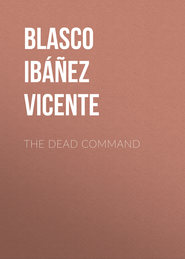По всем вопросам обращайтесь на: info@litportal.ru
(©) 2003-2024.
✖
The Torrent (Entre Naranjos)
Настройки чтения
Размер шрифта
Высота строк
Поля
"Look out for that Ramón … He's a tough proposition."
Along with all this combativeness, he sought to win friends by a lavish hand that was his father's torment. He "did favors," assured a living, that is, to every loafer and bully in town. He was ready to be "touched" by anyone who could serve, in tavern and café, as advertising agent of his rising fame.
And he rose rapidly, in fact. The old folks who had pushed him forward with influence and counsel soon found themselves left far behind. In a short time he had become alcalde; his prestige outgrew the limits of the city, spread over the whole district, and eventually reached the capital of the province itself. He got able-bodied men exempted from military service; he winked at corruption in the city councils that backed him, although the perpetrators deserved to go to prison; he saw to it that the constabulary was not too energetic in running down the roders, the "wanderers," who, for some well-placed shot at election time, would be forced to flee to the mountains. No one in the whole country dared make a move without the previous consent of don Ramón, whom his adherents always respectfully called their quefe, their "chief."
Old Brull lived long enough to see Ramón reach the zenith of his fame. That scallawag was realizing the old man's dream: the conquest of the city, ruling over men where his father had gotten only money! And, in addition don Jaime lived to see the perpetuation of the Brull dynasty assured by the birth of a grandson, Rafael, the child of a couple who had never loved each other, but were united only by avarice and ambition.
Old Brull died like a saint. He departed this life with the consolation of all the last sacraments. Every cleric in the city helped to waft his soul heavenward with clouds of incense at the solemn obsequies. And, though the rabble—the political opponents of the son, that is—recalled those Wednesdays long before when the flock from the orchards would come to let itself be fleeced in the old Shylock's office, all safe and sane people—people who had something in this world to lose—mourned the death of so worthy and industrious a man, a man who had risen from the lowest estate and had finally been able to accumulate a fortune by hard work, honest hard work!
In Rafael's father there still remained much of the wild student who had caused so many tongues to wag in his youthful days. But his doings with peasant girls were hushed up now; fear of the cacique's power stifled all gossip; and since, moreover, affairs with such lowly women cost very little money, doña Bernarda pretended to know nothing about them. She did not love her husband much. She was leading that narrow, self-centered life of the country woman, who feels that all her duties are fulfilled if she remains faithful to her mate and keeps saving money.
By a noteworthy anomaly, she, who was so stingy, so thrifty, ready to start a squabble on the public square in defense of the family money against day-laborers or middlemen, was tolerance itself toward the lavish expenditures of her husband in maintaining his political sovereignty over the region.
Every election opened a new breach in the family fortune. Don Ramón would receive orders to carry his district for some non-resident, who might not have lived there more than a day or two. So those who governed yonder in Madrid had ordered—and orders must be obeyed. In every town whole muttons would be set turning over the fires. Tavern wine would flow like water. Debts would be cancelled and fistfulls of pesetas would be distributed among the most recalcitrant, all at don Ramón's expense of course. And his wife, who wore a calico wrapper to save on clothes and stinted so much on food that there was hardly anything left for the servants to eat, would be arrayed in splendor when the day for the contest came around, ready in her excitement to help her husband throw the entire house through the window, if need be.
This, however, was all pure speculation on her part. The money that was being scattered so madly broadcast was a "loan" simply. Some day she would get it back with interest. Already her piercing eyes were caressing the tiny, dark-complexioned, restless little creature that lay across her knees, seeing in him the privileged heir-apparent who would one day reap the harvest from all such family sacrifices.
Doña Bernarda had taken refuge in religion as in a cool, refreshing oasis in the desert of vulgarity and monotony in her life. Her heart would swell with pride every time a priest would say to her in the church:
"Take good care of don Ramón. Thanks to him the wave of demagogy halts at the temple door and evil fails to triumph in the District. He is the bulwark of the Lord against the impious!"
And when, after such a declaration, which flattered her worldly vanity and assured her of a mansion in Heaven, she would pass through the streets of Alcira in her calico wrapper and a shawl not over-clean, greeted affectionately, effusively, by the leading citizens, she would pardon don Ramón all the infidelities she knew about and consider the sacrifice of her fortune a good investment.
"If it were not for what we do, what would happen to the District.... The lower scum would conquer—those wild-eyed mechanics and common laborers who read the Valencian newspapers and talk about equality all the time. And they would divide up the orchards, and demand that the product of the harvests—thousands and thousands of duros paid for oranges by the Englishmen and the French—should belong to all." But to stave off such a cataclysm, there stood don Ramón, the scourge of the wicked, the champion of "the cause" which he led to triumph, gun in hand, at election time; and just as he was able to send any rebellious trouble-maker off to the penal settlement, so he found it easy to keep at liberty all those who, despite the various murders that figured in their biographies, lent themselves to the service of the government in this support of "law and order!"
The patrimony of the House of Brull went down and down, but its prestige rose higher and higher. The sacks of money filled by the old man at the cost of so much roguery were shaken empty over all the District; nor were several assaults upon the municipal treasury sufficient to bring them back to normal roundness. Don Ramón contemplated this squandering impassively, proud that people should be talking of his generosity as much as of his power.
The whole District worshipped as a sacred flagstaff that bronzed, muscular, massive figure, which floated a huge, flowing, gray-flecked mustache from its upper end.
"Don Ramón, you ought to remove that bush," his clerical friends would say to him with a smile of affectionate banter. "Why, man, you look just like Victor Emmanuel himself, the Pope's jailer."
But though don Ramón was a fervent Catholic (who never went to mass), and hated all the infidel turnkeys of the Holy Father, he would grin and give a satisfied twirl at the offending mouth-piece, quite flattered at bottom to be likened to a king.
The patio of the Brull mansion was the throne of his sovereignty. His partisans would find him there, pacing up and down among the green boxes of plantain trees, his hands clasped behind his broad, strong, but now somewhat stooping back—a majestic back withal, capable of supporting hosts and hosts of friends.
There he "administered justice," decided the fate of families, settled the affairs of towns—all in a few off-hand but short and decisive words, like one of those ancient Moorish kings who, in that selfsame territory, centuries before, legislated for their subjects under the open sky. On market-days the patio would be thronged. Carts would stop in long lines on either side of the door. All the hitching-posts along the streets would have horses tied to them, and inside, the house would be buzzing like a bee-hive with the chatter of that rustic gentry.
Don Ramón would give them all a hearing, frowning gravely meanwhile, his chin on his bosom and one hand on the head of the little Rafael at his side—a pose copied from a chromo of the Kaiser petting the Crown Prince.
On afternoons when the Ayuntamiento was in session, the chief could never leave his patio. Of course not a chair in the city hall could be dusted without his permission; but he preferred to remain invisible, like a god, knowing well that his power would seem more terrible if it spoke only from the pillar of fire or from the whirlwind.
All day long city councilors would go trotting back and forth from the City Hall to the Brull patio. The few enemies don Ramón had in the Council—meddlers, doña Bernarda called them—idiots who swallowed everything in print provided it were against the King and religion—attacked the cacique persistently, censuring everything he did. Don Ramón's henchmen would tremble with impotent rage. "That charge must be answered! Let's see now: somebody go and ask the boss!"
And a regidor would be off to don Ramón's like a greyhound; and arriving at the patio panting, out of breath, he would heave a sigh of relief and contentment at sight of "the chief" there, pacing up and down as usual, ready to get his friends out of their difficulties as if the limitless resources of Providence were at his command. "So-and-So said this-and-that!" Don Ramón would stop in his tracks, think a moment, and finally say, in an enigmatic oracular voice: "Very well, tell him to put this in his pipe and smoke it!" Whereupon the henchman, mouth agape, would rush back to the session like a racehorse. His companions would gather about him eager to know the reply that don Ramón's wisdom had deigned to suggest; and a quarrel would start then, each one anxious to have the privilege of annihilating the enemy with the magic words—all talking at the same time like magpies suddenly set chattering by the dawn of a new light.
If the opposition held its ground, again stupefaction would come over them. Another mad dash in quest of a new consultation. Thus the sessions would go by, to the great delight of the barber Cupido—the sharpest and meanest tongue in the city—who, whenever the Council met, would observe to his early morning shaves:
"Holiday today: the usual race of councilors bare-back."
When party exigencies forced don Ramón to be out of town, it was his wife, the energetic doña Bernarda, who attended to the consultations, issuing statements on party policy, as wise and apt as those of "the chief" himself.
This collaboration in the upbuilding and the up-holding of the family influence was the single bond of union between husband and wife. This cold woman, a complete stranger to tenderness, would flush with pleasure every time the chief approved her ideas. If only she were "boss" of "the Party!" …Don Andrés had often said as much himself!
This don Andrés was her husband's most intimate friend, one of those men who are born to be second everywhere and in everything. Loyal to the family to the point of sacrifice, he served, with the couple itself, to fill out the Holy Trinity of the Brull religion that was the faith of all the District. Where don Ramón could not go in person, don Andrés would be present for him, as the chief's alter ego. In the towns he was respected as the supreme vicar of that god whose throne was in the patio of the plantain trees; and people too shy to lay their supplications before the god himself, would seek out that jolly advocate,—a very approachable bachelor, who always had a smile on his tanned, wrinkled face, and a story under his stiff cigar-stained mustache.
Don Andrés had no relatives, and spent almost all his time at the Brull's. He was like a piece of furniture that seems always to be getting in the way at first; but when all were once accustomed to him, he became an indispensable fixture in the family. In the days when don Ramón had been a young subordinate of the Ayuntamiento, he had met and liked the man, and taking him into the ranks of his "heelers," had promoted him rapidly to be chief of staff. In the opinion of the "boss," there wasn't a cleverer, shrewder fellow in the world than don Andrés, nor one with a better memory for names and faces. Brull was the strategist who directed the campaign; don Andrés the tactician who commanded actual operations and cleaned up behind the lines when the enemy was divided and undone. Don Ramón was given to settling everything in a violent manner, and drew his gun at the slightest provocation. If his methods had been followed, "the Party" would have murdered someone every day. Don Andrés had a smooth tongue and a seraphic smile that simply wound alcaldes or rebellious electors around his little finger, and his specialty was the art of letting loose a rain of sealed documents over the District that started complicated and never-ending prosecutions against troublesome opponents.
He attended to "the chief's" correspondence, and was tutor and playmate to the little Rafael, taking the boy on long walks through the orchard country. To doña Bernarda he was confidential adviser.
That surly, severe woman showed her bare heart to no one in the world save don Andrés. Whenever he called her his "señora," or his "worthy mistress," she could not restrain a gesture of satisfaction; and it was to him that she poured out her complaints against her husband's misdeeds. Her affection for him was that of a dame of ancient chivalry for her private squire. Enthusiasm for the glory of the house united them in such intimacy that the opposition wagged its tongues, asserting that doña Bernarda was getting even for her husband's waywardness. But don Andrés, who smiled scornfully when accused of taking advantage of the chief's influence to drive hard bargains to his own advantage, was not the man to be trifled with if gossip ventured to smirch his friendship with the señora.
Their Trinity was most closely cemented, however, by their fondness for Rafael, the little tot destined to bring fame to the name of Brull and realize the ambitions of both his grandfather and his father.
Rafael was a quiet, morose little boy, whose gentleness of disposition seemed to irritate the hard-hearted doña Bernarda. He was always hanging on to her skirts. Every time she raised her eyes she would find the little fellow's gaze fixed upon her.
"Go out and play in the patio," the mother would say.
And the little fellow, moody and resigned, would leave the room, as if in obedience to a disagreeable command.
Don Andrés alone was successful in amusing the child, with his tales and his strolls through the orchards, picking flowers for him, making whistles for him out of reeds. It was don Andrés who took him to school, also, and who advertised the boy's fondness for study everywhere.
If don Rafael were a serious, melancholy lad, that defect was chargeable to his interest in books, and at the Casino, the "Party's" Club, he would say to his fellow-worshippers:
"You'll see something doing when Rafaelito grows up. That kid is going to be another Canovas."
And before all those rustic minds the vision of a Brull at the head of the Government would suddenly flash, filling the first page of the newspapers with speeches six columns long, and a To Be Continued at the end; and they could see themselves rolling in money and running all Spain, just as they now ran their District, to their own sweet wills.
Never did a Prince of Wales grow up amid the respect and the adulation heaped upon little Brull. At school, the children regarded him as a superior being who had condescended to come down among them for his education. A well-scribbled sheet, a lesson fluently repeated, were enough for the teacher, who belonged to "the Party" (just to collect his wages on time and without trouble,) to declare in prophetic tones:
"Go on working like that, señor de Brull. You are destined to great things."
At the tertulias his mother attended evenings in his company, it was enough for him to recite a fable or get off some piece of learning characteristic of a studious child eager to bring his school work into the conversation, for the women to rush upon him and smother him with kisses.
"But how much that child knows!… How brilliant he is!"
And some old woman would add, sententiously:
"Bernarda, take good care of the child; don't let him use his brain so much. It's bad for him. See how peaked he looks!…"
He finished his preparatory education with the Dominicans, taking the leading rôle in all the plays given in the tiny theatre of the friars, and always with a place in the first line on prize days. The Party organ dedicated an annual article to the scholastic prodigies of the "gifted son of our distinguished chief don Ramón Brull, the country's hope, who already merits title as the shining light of the future!"
When Rafael, escorted by his mother and half a dozen women who had witnessed the exercises, would come home, gleaming with medals and his arms full of diplomas, he would stoop and kiss his father's hard, bristly hand; and that claw would caress the boy's head and absent-mindedly sink into the old man's vest pocket—for don Ramón expected to pay for all welcome favors.
"Very good," the hoarse voice would murmur. "That's the way I like to see you do …Here's a duro."
And not till the following year would the boy again know what a caress from his father meant. On certain occasions, playing in the patio, he had surprised the austere old man gazing at him fixedly, as if trying to foresee his future.
Don Andrés took charge of settling Rafael in Valencia when he began his university studies. The dream of old don Jaime, disillusioned in the son, would be fulfilled in the third generation!















